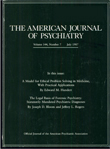TO THE EDITOR: Dr. Boland suggests that our finding that HIV-positive men were not more depressed as their illness progressed was related to their being predominantly white, well educated, and in relatively secure economic and social circumstances. He proposes that study of groups at greater risk for depression among HIV-positive patients, such as the poor, substance abusers, and women, might produce different results.
During the years that we conducted our longitudinal study of HIV seropositive and seronegative gay white men, we conducted a parallel longitudinal study of HIV seropositive and seronegative minority substance-abusing men and women (
1). We modified measures to accommodate the possibility of shorter attention spans and lower literacy levels but otherwise used parallel assessments and design.
We followed 121 men (69 HIV-positive, 52 HIV-negative) and 66 women (36 HIV-positive, 30 HIV-negative) semiannually for seven visits. Attrition, unrelated to sex or serostatus, was 33%. At study baseline, rates of major depression and dysthymia ranged from 15% (HIV-negative men) to 33% (HIV-negative women). Global impairment at baseline was in the range found among psychiatric patients. Rates of syndromal disorders did not show any consistent variation over time by HIV status, although HIV-positive men had higher levels of distress and greater impairment than HIV-negative men. Serostatus did not predict distress levels among women.
These rates of psychopathology and impairment are much higher than we found among the gay cohort but did not increase over time. In fact, all groups showed statistically significant but clinically modest reductions in measures of distress, rates of psychopathology, and drug use over time. Although all indices remained elevated, this is true for both HIV-negative and HIV-positive men and women; HIV status is therefore not the primary determinant.
In studying the roles of social support and stress in this cohort, we found that higher levels of social support and lower levels of social conflict were independently associated with less distress and improved global functioning among both men and women. For men, more social support and less social conflict was associated with less stress, independent of time and HIV status or their interaction. For women, stress declined over time and was exacerbated by social conflict, independent of HIV status.
As in the gay cohort, no correspondence was observed between laboratory markers of HIV progression and distress severity. However, we did observe an interaction between HIV symptoms and distress level: with the passage of time, those with fewer HIV symptoms showed more psychological improvement than those with more HIV symptoms.
Although both of our cohort studies had limitations in terms of relatively small group sizes, nontrivial attrition, and relatively modest HIV disease progression, their results are similar and support our fundamental point that depression is not an inevitable or even probable consequence of living with a progressive, incurable, and possibly fatal disease.
Additional studies of such questions and further work with HIV-positive minority populations are certainly indicated, and we are pleased to hear that Dr. Boland's group is pursuing such research.

